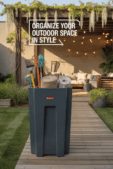
There’s more salt on my garage floor this winter than I have ever seen. I need to clean it off before it ruins the concrete.
Before cleaning the garage with a vacuum and then a mop, consider using the right pressure washer attachments instead. The pressure washer eliminates the post-wash rinse. Or do the traditional: hose down a concrete floor; and use hot, soapy water and a mop on the garage floor.
The dirt on a garage floor can be more than annoying. Salt and sand will eat away at the concrete’s top layer. Dirt tracks into the house, and the dirty floor just looks bad. Keeping the floor clean is easier than undoing years of grime and salt.
Clean the Garage Floor for Safety and Value
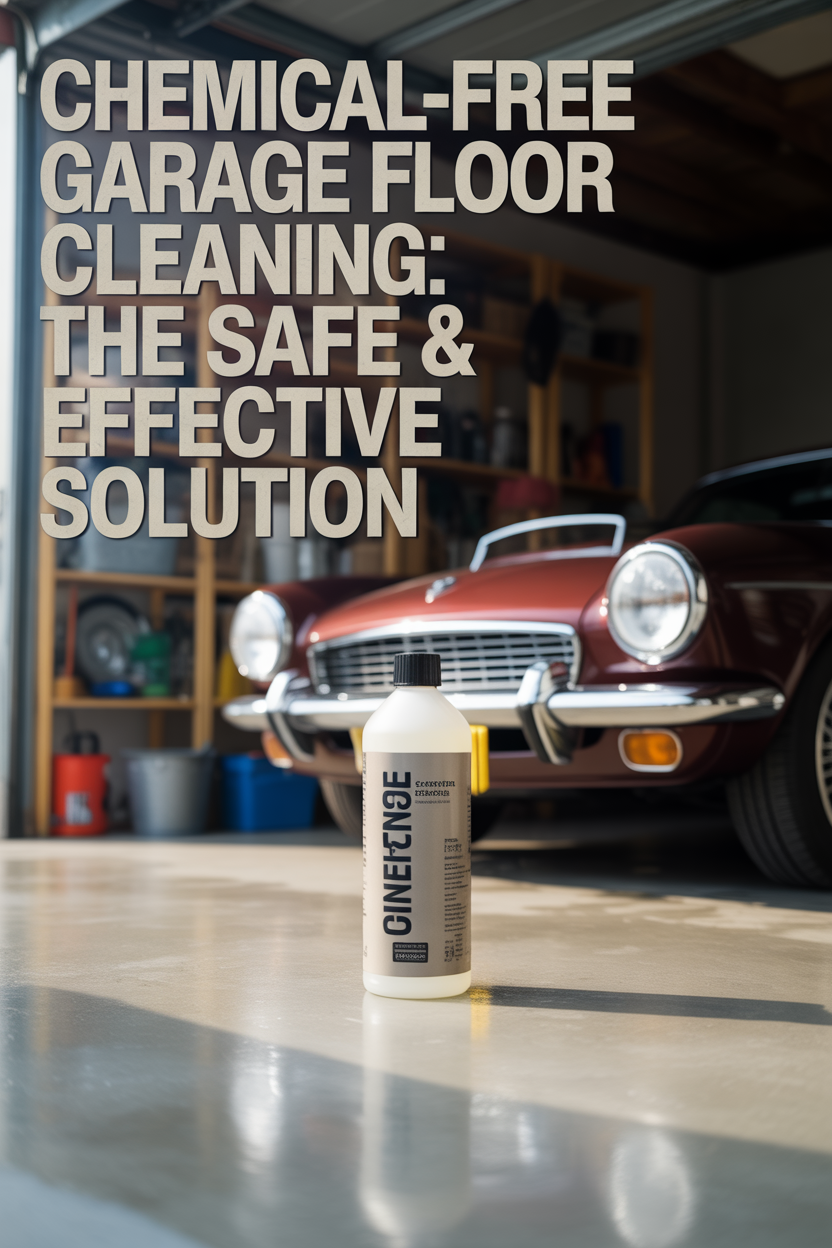
A clean garage floor is essential to a great-looking garage. Stains and puddles can cause trips and falls. Salt eats away at concrete. Dirt and grime track into the home. For safety and aesthetics, keep the garage floor clean.
To see how road salt damages concrete garage floors, see my article: How Do You Fix Garage Floor Spalling and Pitting? (opens in a new window)
The Problem with Traditional Garage Floor Cleaning Methods
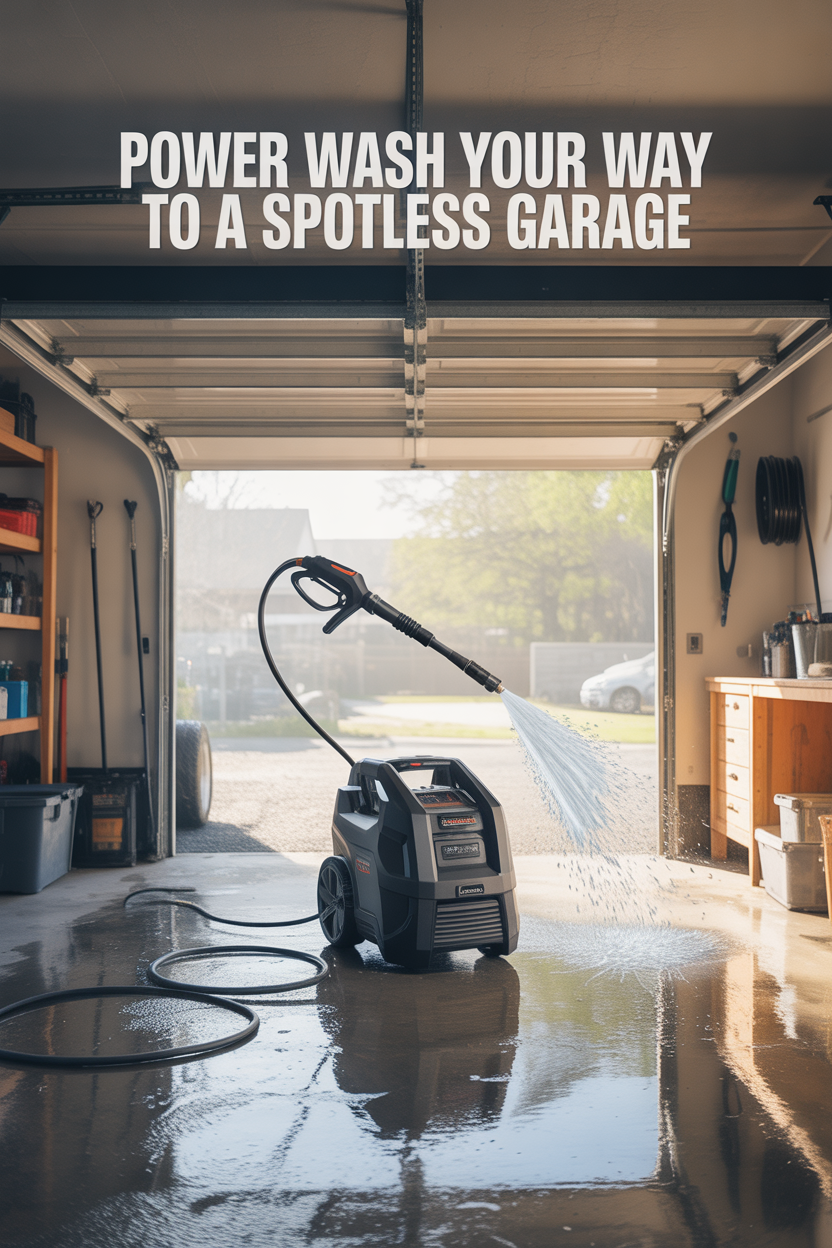
Most garage floor cleaning methods rely on harsh chemicals and abrasive scrubbing, which can damage the surface of your floor and make the stains even harder to remove.
Additionally, many of these cleaning products are hazardous to your health and the environment, creating a risk that you simply don’t need to take.
Introducing the Best Solution for Cleaning Your Garage Floor

The best way to clean your garage floor is with a pressure washer.
With the right pressure washer and the right attachments, you can blast away dirt, grime, and grease in no time, leaving your floor looking as good as new.
Not only is this method faster and more effective than traditional cleaning methods, but it’s also safer for you and the environment.
How to Buy a Pressure Washer to Clean the Garage Floor

When buying a pressure washer, there are several factors to consider. Here are some of the most important things to keep in mind. These are:
- Pressure and flow
- Power Source
- Price
- Features (nozzles, tires)
How Much Pressure Do You Need?
The first thing you need to look at is the pressure and flow of the pressure washer.
The pressure is measured in PSI (pounds per square inch), and the flow is measured in GPM (gallons per minute).
The higher the PSI and GPM, the more powerful the pressure washer.
You want to look for a pressure washer with a minimum of 2000 PSI and 2 GPM for cleaning your garage floor.
According to Champion Equipment, here are the pressure values to choose for household cleaning tasks.
- 1300-1900 PSI: Bikes, BBQ Grills, Patio Furniture, Fencing, Vehicles
- 2000-2800 PSI: Patio Furniture, Fencing, Vehicles, Boats, RVs, Stairs, Decks, Patios, Sidewalks, and Driveways
- 2900-3500 PSI: Stairs, Siding, Decks, Patios, Sidewalks, Driveways, Oil Stains, Second Stories, Industrial Equipment
- 3600+ PSI: Sidewalks, Driveways, Oil Stains, Second Stories, Industrial Equipment, Paint Prep
The Right Garage Floor Power Washer Tip
For most garages, use the 40-degree tips on the concrete floor.
Power washer tips are standardized sizes, so expect to find five tips on any model you choose.
For most garages, use the 40-degree tips on the concrete floor.
- Zero degrees is the most powerful.
- Fifteen, 25, and 40 get progressively wider and therefore weaker.
- The last is the lightest or the soap dispenser.
You might ask, why not use the zero tip for everything? Zero tips are destructive. They take the paint off cars and strip fences. So you have to choose your battles.
Use tips as follows:
- Tips 15, 25, 40, or soap: Concrete, Brick, Masonry
- Tips 40 or soap: Concrete, Brick, Masonry, Siding, Gutters, Home, Fencing, Deck, Patio, Lawn, and Garden Equipment, Boats, RVs
- Tips 15, 25, 40, or soap: Concrete, Brick, Masonry
Electric or Gas Power Washer Choices
The next thing to consider is the power source of the pressure washer. There are two types of power sources: electric and gas-powered.
Electric pressure washers are easier to use and maintain, but they are not as powerful as gas-powered pressure washers. Electric washers don’t need fuel or oil.
Gas-powered pressure washers are more powerful and can handle tougher cleaning jobs, but they are harder to use and maintain than electric pressure washers. You will need to feed your gas pressure washer with oil and gasoline.
Either will easily clean the garage floor, so the decision is about your preferences.
Electric power washers:
- are quiet
- do not put out fumes
- require a cord during operation
- do not “run out of fuel”
Gas power washers:
- are loud
- put out fumes
- do not require a cord during operation
- will run out of fuel
A gas-pressure washer is typically more powerful than an electric one, but this is not always the case. Gas washers are loud (you should wear ear muffs using them). They require you to have gas around the home to refill them.
Electric pressure washers are quiet and have no exhaust fumes. An electric washer either plugs into an outlet or uses a rechargeable battery. One that plugs in ties you to the length of your extension cord.
A rechargeable washer requires you to remember to keep the battery charged. Battery washers have a definite session length before they fail. If you get a second battery and keep it charged, you double your work time.
The Cost of a Good Power Washer
An electric pressure washer costs between $115 and $425. A gas-powered washer costs between $400 and $1700. Professional power washers cost between $600 and $25,000.
- An electric pressure washer with 2000 PSI and 2.0 GPM costs between $115 and $425
- A gas-powered washer with 4200 PSI and 3.5 GPM costs as much as $1700
Power washer prices range from $150 to $25,000. How do you choose?
The difference between a home and an industrial washer starts to merge at about the $600 price point. This is where pressure washers take on industrial power.
You can always tamp down the power of a powerful machine, but you can never make a weak machine more powerful.
Take a look at these Champion gas-powered pressure washers. Notice the leap in price from the 2800 PSI to the 3500 PSI. The 2800 and 3100 PSI Champion pressure washers (gas-powered) are under $400 at the time of writing this article. The 3500 PSI suddenly leaps to over $600, because this is where the real power in power washes really begins. The 4200 PSI is over $800 and is a power washer a paint company would be happy to own.
The more powerful the washer, the faster you get the work done. If the power washer is too powerful, you can muffle the output using a wider tip on the end of the spray gun.
You can always tamp down the power of a powerful machine, but you can never make a weak machine more powerful.
Power Washer Features: Nozzles, Tanks, and Tires
Finally, you want to look for a pressure washer that has all the features you need. Some of the most important features to look for include:
- Quick-connect nozzles make it easy to change the nozzles from pinpoint to wide spray
- Detergent tank to add soap to the washer and release it using the spray gun
- Big tires to ease the strain when pulling the washer around the yard
It’s a rare pressure washer that has anything but five tips. They come in zero degrees, 15 degrees, 25 degrees, 40 degrees, and low pressure. That is, they run from very pinpointed flow to very wide and muffled water flow.
Four Steps to Pressure Washing the Garage Floor
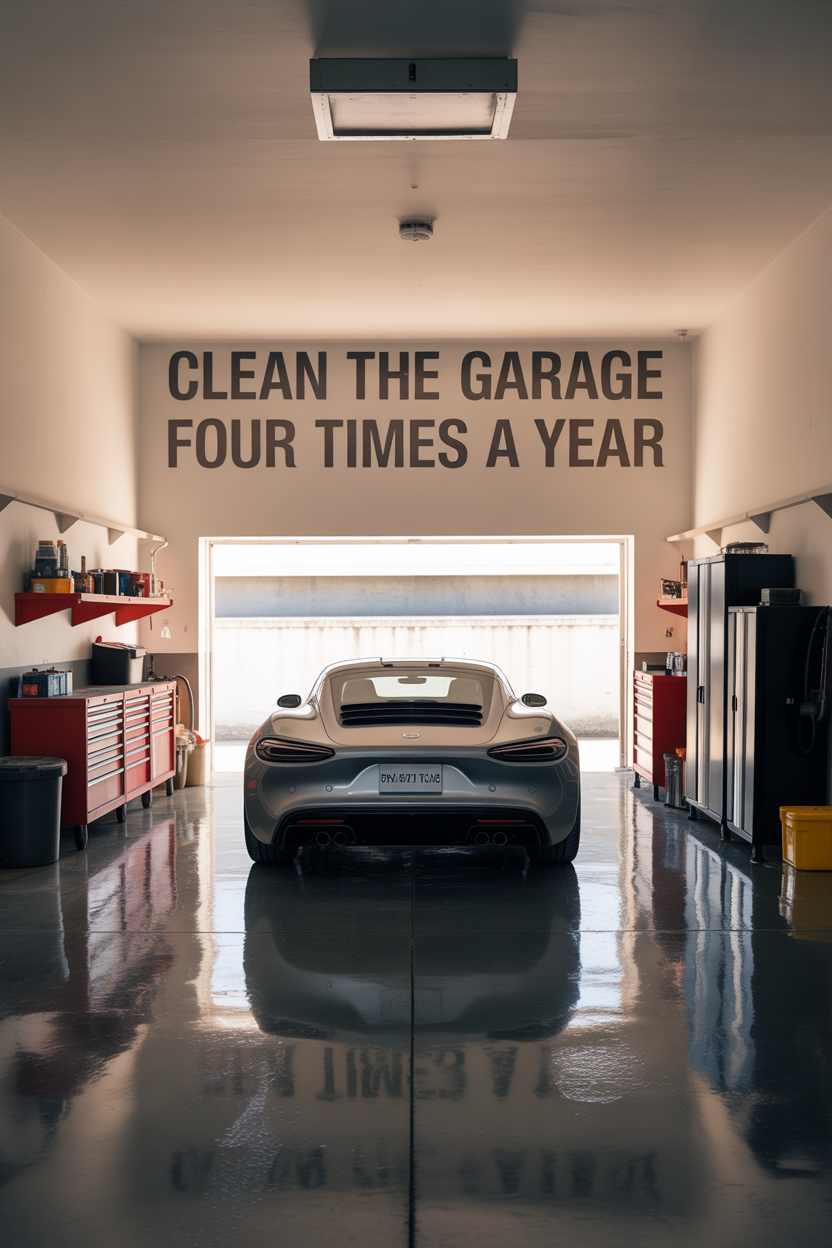
- Optional: Start with vacuuming or sweeping away the loose debris. The power washer is going to finish vacuuming for you by blowing the dirt out of the garage and onto the driveway.
- Attach a spray (rather than a pinpoint) attachment to your pressure washer.
- Start at the back of the garage and work your way to the open doors.
- Slightly overlap each pass to ensure even coverage.
- Don’t hold the spray in one spot for too long on concrete as it will dig a hole.
Clean the Garage Four Times per Year
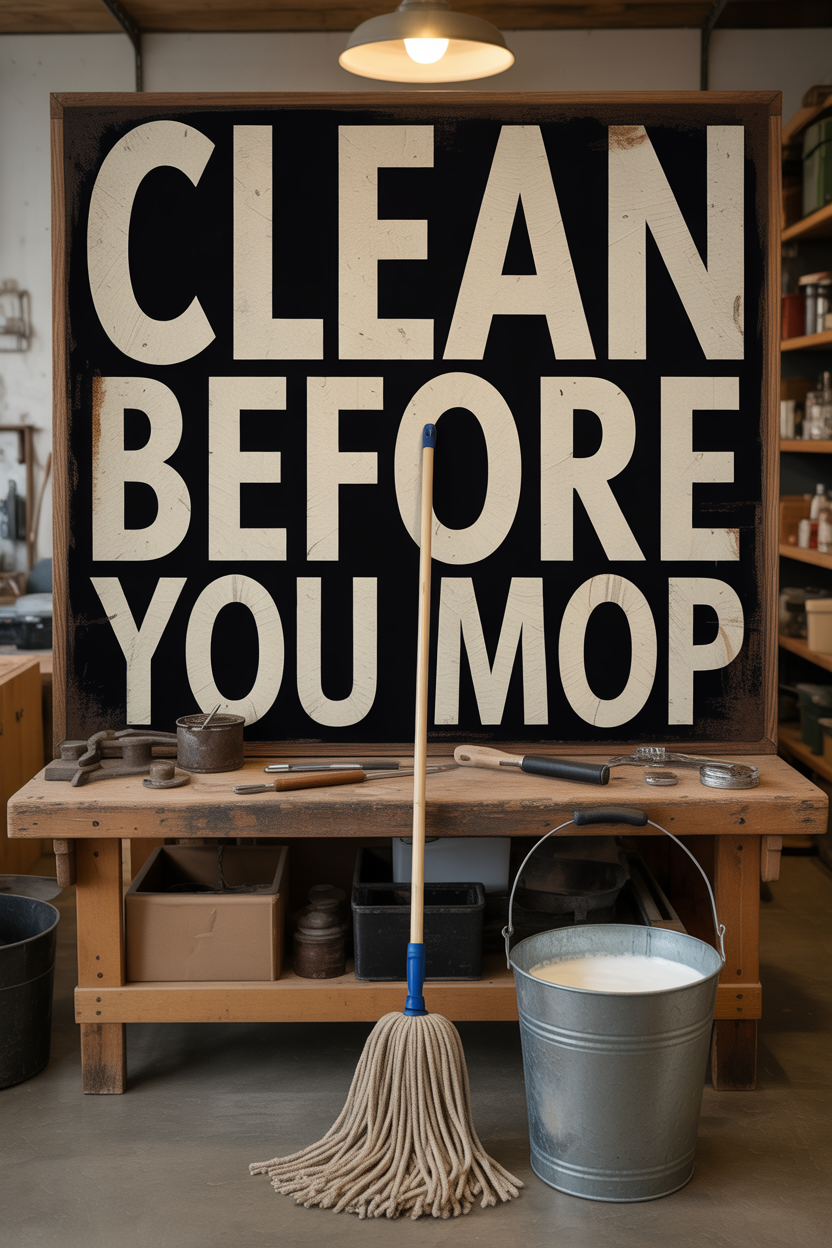
Clean your garage floor at the beginning of every season. In the spring, wash away the winter’s sand and salt. In the summer, wash away the spring’s mud and water. In the fall, wash away the summer’s grime and dust. In the winter, wash away the fall’s leaves and dirt.
Maintenance Garage Floor Cleaning
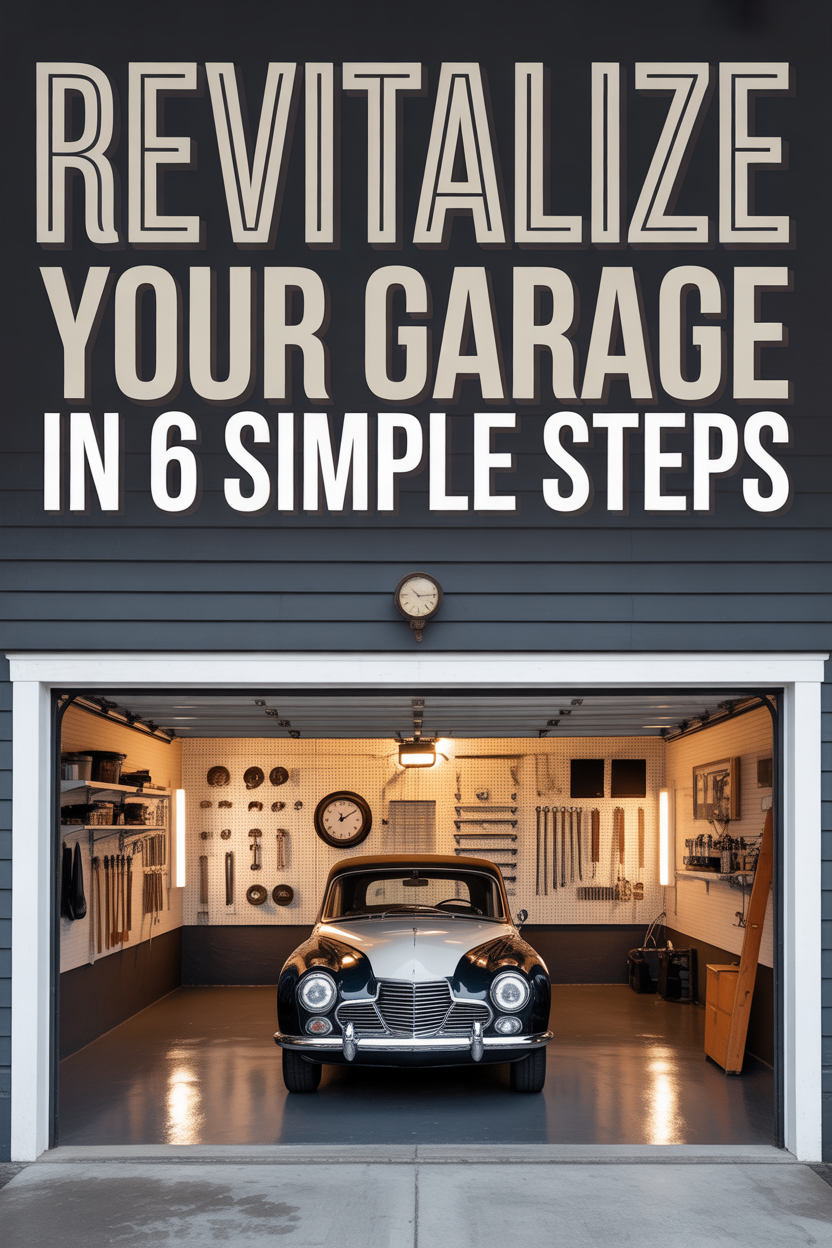
Save the pressure washing for the summer or fall cleaning. When the weather is too cold, then use a mop and bucket.
You will need:
- a vacuum or broom
- a mop
- a bucket
- a small amount of degreasing dish soap (use a little to avoid a huge rinsing job)
Step-by-Step Traditional Cleaning Instructions

- Sweep or vacuum the floor. Start at the back and sweep toward the open door.
- Mix a small amount of dish soap in a bucket with hot water. Do not overdo the soap or you will be rinsing all day.
- Dip the mop into the bucket. Wring out the excess water.
- Mop the floor, starting at the back corner. Work across to the other wall. Then do another row, getting closer to the door with each pass.
- Allow the cleaning solution to sit on the floor for 5-10 minutes.
- Rinse the floor with clean water and allow it to air dry. Use a garden hose (or a pressure washer).
How to Buy a Vacuum Cleaner for the Garage Floor

If you don’t already have a vacuum for the garage floor, look for a “garage vacuum” or a “wet/dry vacuum.” These are the types of vacuums you would use in a garage. For features, decide between wall mounted or wheeled.
You might also want to read my article: What is the Absolute Best Garage Vacuum Cleaner (opens in a new window)
Wet/Dry Vacuums
Wet/Dry vacuums are versatile cleaners that can handle both wet and dry messes. They’re ideal for garages because they can pick up everything from spilled oil and grease to sawdust and dirt. Some models even come with attachments for cleaning hard-to-reach areas like crevices and corners.
I have my own opinions about the best wet/dry garage vacuums that I share with you here: The Best Garage Wet Vacs.
Shop Vacs
“Shop Vac” is actually a brand name that turned into a generic term. It’s probably better to search for a “garage vac” to find what you need.
Handheld Vacuums
Handheld vacuums are great for quick clean-ups, but they’re not ideal for cleaning large areas like garages. They’re small and portable, so they’re easy to store, but they don’t have the suction power of other types of vacuums.
How to Keep the Garage Floor Clean

- Vacuum or sweep the garage as often as you see dirt piling up. At a minimum, use the four times-per-year schedule to keep the floor clean.
- Add entryway mats to wipe your feet before going into the house.
- Use snow mats under your cars in the winter. These catch the ice and salt that stick to your car and drop onto the floor as the ice melts.
You might also want to read my article: Garage Floor Mat Materials: Choosing the Best Mat Material for Your Needs (opens in a new window)
Get garage mats that include an oil absorption feature. These mats have extra rubber to separate the oil from the garage floor. Consider getting a mat with a good grip on the bottom.
The annoying thing about regular carpets is that the corners flip up. They become a trip hazard when they’re not taped to the floor. You might need to tape them down with heavy-duty tape.
For real protection, all the way around, get a couple of rolls of heavy-duty floor mats. The rubber roll-out mats unfurl in one piece. Install roll-out mats starting at the back of the garage and unroll them toward the door.
Roll-out mats are embossed with diamond or coin shapes. Any water falls below the embossed area and away from your feet. The patterns help make them anti-slip.
Roll-out mats are a superior option to epoxy and paint, according to some garage owners, because they offer so much protection for so little work. It’s very much a matter of opinion, as some people say that only polyurethane sealant will protect a garage floor.
For help deciding, I wrote these articles for you: Is Rubber Roll-Out Flooring a Good Garage Floor Covering? and What Are the Two Types of Garage Floor Concrete Floor Sealer?
If, after reading all that, you still want to epoxy your floor, I’ll either talk you out of it (I Will Never Epoxy My Garage Floor (What I Will Do Instead), or help you proceed Pros and Cons of Applying Epoxy to the Garage Floor and What is the Best Epoxy for a Garage Floor?).
But what about paint? Isn’t that a good way to protect the garage floor? Your pressure washer will definitely strip the paint from your garage floor if you let it, so I think of paint more as a pretty coating than a protector. But that’s not fair to paint, because it does have some good qualities, as you can see in my article here: Should I Paint My Garage Floor?
For the cost, rubber roll-out mats are competitive with paint and epoxy. The cheapest way to protect the floor is with garage floor mats. The carpeted tops are nice on the feet but accumulate a lot of dirt and debris. For the pros and cons of carpet and rubber mats, as well as 5 more types, see my article Are Garage Mats Worth It?






